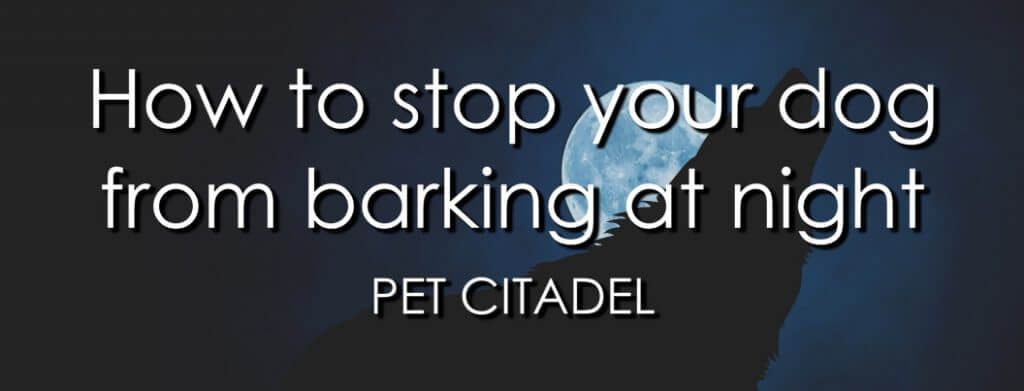This post may contain affiliate links. You can view our affiliate disclosure here.

After a long day of work, a night of good night sleep is just what we need. Maybe you just want to snuggle up in a comfy bed with the lights off and the phone turned off.
It might be bedtime for you, but your dog doesn’t want to sleep just yet. If your dog keeps barking and it’s keeping you up during the night, or even worse still, making you wake up at an ungodly hour, you are not alone.
Many dog owners face the same issue and need to learn how to solve it and bond even more with their dogs.
Before I get into the causes and solutions of dogs barking at night, I just want to look at the time before dogs were domesticated to give you a historical perspective.
In those days, dogs would live in a pack, which would cooperate to survive and procreate. There was a strict hierarchy with a pack leader.
Males would be involved in the raising of cubs. In order to ensure they had the space in which to hunt and live, each pack would establish a territory and other wolves were discouraged from entering it.
Wolves have sensitive hearing and smell and could detect the presence of an intruder at quite some distance. Instead of expending energy to rush out and challenge intruders, the wolves would howl and bark to make the intruder aware that the pack knew about the intrusion and as a warning to go away.
Only if the intruder ignored the warning did the pack go to ward off the challenge.
A Substitute Pack
When dogs were first domesticated, they lived outside and ate the scraps generated by the household. The more limited resources meant that dogs could no longer cooperate with one another, and instead of the shared territories they had as a wolf pack, they developed individual territories.
Because of the inherent disposition of dogs to live in a community, the dogs developed a strong relationship with “their” humans and even extended this to other domesticated animals owned by them.

When dogs and cats are brought up together, they develop a relationship, and often if the family cat is threatened by another cat, the dog will intervene.
The Role Of The Dog
The dog has come to see its role as protecting its substitute pack and keeping rival dogs and cats away from the home territory.
It is aware of its neighbors and surroundings, and understandings have been reached over where territories begin and end.
If it meets a neighboring dog in the daytime, then it might play with it for a while, but there is always an understanding that the resources (scraps) in a territory are not shared.
Why Dogs Bark At Night
Although we don’t realize it, there is nearly always a reasonable answer to the question “why do dogs bark at night?” Let’s explore them now:
1. Nighttime Guarding
Throughout the night, your dog will be aware of activities in the neighborhood. In fact, with its superior hearing and smell, it can keep track of a large radius around where it lives.
Your dog has smelled the neighboring dogs and will have a picture of the neighboring territories. It will have smelled lampposts and picked up scents to identify who belongs where. If it all of a sudden detects an intruder that it does not recognize at night, then that is a potential threat and it will bark.
If one of the dogs on the periphery of its awareness barks a warning, then your dog might also bark to ensure that the intruder doesn’t head its way. You didn’t hear the first bark, so you wonder why your dog has started barking.
2. Protecting Their Pack

When a dog that is confined to a crate at night sees and hears the interactions of cats in the neighborhood, it may well bark as a warning to neighboring cats to back off.
Because the individual interaction between the cats was so quiet, we never hear it, but the dog does.
3. Other Noises And Potential Threats
Your dog will be aware of the usual noises that he hears at night and decided that they are not a threat, but occasionally a new noise is heard and your dog might bark a warning.
This could be a car starting a few houses away, a door banging, or unidentified people walking down the street. On other occasions, your dog might randomly choose a sound it has heard many times and on that occasion decide it might be a threat.
4. Expressing Emotions
Your dog is not concerned with our social norms and our worries about neighbors complaining. If your dog wants to communicate something, it will.
The dog might feel lonely, anxious, hungry, or in pain. If it does, it will instinctively announce it to the world. It will bark or possibly howl. It may just want reassurance that everything is okay, and by barking he knows that other local dogs will join in.
Studies have been done that have identified that certain barks have meanings. They can’t use words, but they can express emotions in their barks.
There has been some research carried out on Hungarian sheepdogs. They used computers to analyze barks and found at least four different emotions expressed.
5. Communication With Humans

Have you ever seen your dog pull back its lips and apparently smile?
This is a form of communication that dogs have developed just for communicating with humans, called a submissive grin. Dogs do not do this when interacting with one another.
There is no doubt that dogs have become very reliant and attached to their humans. As a result of this attachment, some dogs become anxious when separated from them. They react by barking.
Dogs can also become lonely when separated from the humans they spend their days with. Because of this closeness with humans, your dog may occasionally just bark at a random times during the night, and there is genuinely no reason other than the dog just reminding everyone that it is there. It’s nothing more than a “Hey, you forgot to let me in the house!”
Of course, if you and I have a pain somewhere, we can tell someone and describe the pain. Your dog may just bark to say “it hurts” and since humans find it hard to decipher the types of barks, we may well not realize that the dog is in pain.
How To Stop The Behaviour
Much as we like to think our dog understands us when we talk to it, in reality, the dog has to fit us into a narrow world view, and it fits our existence into its own perceptions of the world.
When there is a noise, it may well be saying “Hey, didn’t you hear that? Do something!” It sees the protection of its territory as one of the primary functions of “pack members”. If we don’t react to possible threats, then the dog certainly will.
So, how exactly do we fix the problem? Below are some of the best ways to stop your dog from barking. While each method can be effective, don’t expect astonishing results overnight.
Often times, a dog’s barking issue may stem from a rather simple concept: if it barks and whines, that will attract your attention, irrespective of what hour of the night or day it is.
The longer this behavior has been going on, the longer it will take for you to change it through training. Patience really is a virtue in this case.
1. Get your dog checked by a vet.

One of the first things to do when your dog suddenly starts barking at night, especially after sleeping just previously, is to take a step back and ask yourself if your dog is truly well.
Your dog could be sick. Your dog could have an upset stomach, bladder infection, or any other disease that could cause it to wake at night and start barking because it needs to go help itself.
An underlying physical issue is likely the cause if the barking behavior is new and sudden. Any behavioral issues in your dog or your dog not being its usual self will benefit from a health check at the vet.
2. Ignore the barking.
Ignoring the barking is a way to cope that might be difficult at first. You might want nothing more than to check up on your dog and stop the barking.
But if your dog is barking for attention (like when they’re left alone), if you go to it every time, it will get used to the idea that its barking will drag you towards them, and this doesn’t help to fix the situation.
Rather, you have to make the dog understand that whining and barking will not make you to go to it. In these cases, the right reaction may be not to respond. We recommend ear plugs to block out some of the noise.
Again, I know that going to your dog sounds tempting, but try not giving it any attention at all while it’s barking. Don’t go to it, talk to it, or call out to it. If the dog is in a confined space, let it stay where it is.
If your dog starts to bark louder and more intensely after being ignored, resist the urge to go and comfort it. Once you give it attention, it will develop the mindset that that barking helps to get it whatever it wants, even if it’s once in a blue moon.
And this is reason enough not to change your reaction. Provided you don’t react to its cry for attention by barking at night, it will get to a point where it’ll lack a reason to continue barking, which will lead to it stopping the behavior.
Note that this method will not work with all dogs; it depends on the cause of your dog’s barking. If you’ve ruled out a health problem and you think ignoring the barking might help, give it a try, but if you don’t see any results after 2-3 weeks, try another method.
3. Remove the motivation.
When a dog barks, there’s usually a specific motivator for it. If this weren’t the case, it wouldn’t do it.

Take time to find out what the external stimulant is and remove that motivation. Do not give room for the barking behavior to continue.
If your dog barks at people passing by the window, close the curtains or switch it to a room where it can’t see people or animals outside.
If your dog barks at passersby when it’s outside, bring it into the house.
4. Train your dog to adhere to the “quiet” command.
Despite the potential confusion, the very first step to this method is to teach your dog to bark on command.
Start by teaching your dog the “speak” command. Repeat the training until it starts barking as soon as you say “speak”.
Once your dog has become proficient in barking on command, continue by teaching it the “quiet” command. Repeat the same training you gave it when teaching it to speak.
Have a look at this video demonstration for teaching a dog the “quiet” command:
For instance, when someone is at the door, your dog might start barking to notify you that there is an intruder. With the “quiet” command, it’ll quickly pipe down, and the same idea applies when your dog is barking at night.
In most cases, you can easily stop the barking by training it and commanding it to be quiet.
5. Keep your dog tired.
It is very unlikely for a worn-out dog to start barking out of boredom and frustration at night.
Ensure that your dog gets plenty of both physical training and mental exercises daily. The amount of exercise needed varies depending on the dog’s age, type of breed, and health status.
Most dogs should get at least 30-60 minutes of exercise per day. Walking your dog around, playing chase, and playing with other toys are pretty good activities.
6. Check for possible disturbances.
If your dog is barking at night, there may be some kind of disturbance causing the problem.
For example, there might be a mouse in the house, a raccoon in the trash, cats fighting, a drunk making noise in the streets, or a neighbor who’s leaving the house at 3 a.m. These could all be disturbances that might make your dog suddenly start barking.

If you have a new neighbour, your dog will probably get used to the neighbour’s new schedule in a few days. If there are animals going through your garbage, figure out a way to keep the lid tightly closed so animals can’t get into it. Also take measures to ensure that mice and other pests don’t have a reason to be in or around the house.
These disturbances, if they exist, should be eliminated right away, because it could be the beginning of your dog’s barking behavior, especially if it enjoy the attention the barking has created.
Conclusion
You need to understand why your dog is barking at night. It may be a serious issue that your dog is alerting you to such as a fire, break-in, and so forth.
But don’t give it any more attention than you need to. Don’t give it the idea that barking is a good way to get your attention in the middle of the night.
The strategies discussed above take time and effort to implement, and ignoring your dog’s barking in the middle of the night won’t be easy at first. But keep in mind that when trying to change a behavior like barking, you may very well experience an “extinction burst”, which means that the barking will get worse before it gets better.
Your sleep schedule might be worse during this time as well. To alleviate this, consider wearing ear plugs if the barking isn’t a result of an urgent situation.

Now, if these methods are successful, it’s very much worth the effort, but sometimes, dogs won’t respond well to them.
Sometimes, you won’t be able to stop the barking despite your best efforts. In these cases, your dog may need professional help.
You could get the advice of a professional behaviorist or the help of a dog trainer. But professional dog trainers can be extremely expensive at several hundreds of dollars per hour of help. Not many dog owners can afford this kind of expense.
There’s a solution. You can get instant access to a dog training program by a certified dog trainer with over a decade of experience working with clients.
This trainer has figured out that barking issues fundamentally come down to learning how to calm your dog down and help it regain control of its emotions.
And so he’s put together a series of emotional control exercises that have been proven to overcome barking at night and other barking issues.
This dog training package is substantial, and it costs a tiny fraction of what you would pay for the services of a typical dog trainer or behaviorist.
You can alternatively read my review of the program.
Best of luck in correcting your dog’s barking problem!
Thanks for reading this article. Do you have problems with your dog barking at the night? Feel free to share your experiences or ask questions in the comments below.



